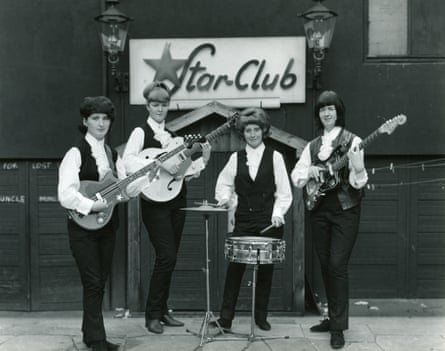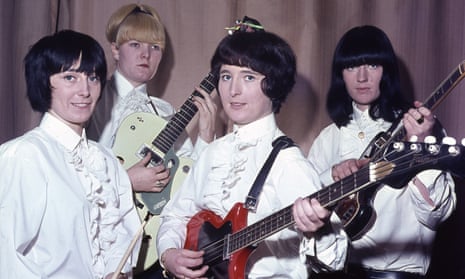In the 1960s, Valerie Gell, who has died aged 71, was part of the all-female Liverpool teenage beat group the Liverbirds. They had their greatest success in Hamburg, with residencies at the Star-Club, where the Beatles had played on and off throughout 1962 before their chart breakthrough and where the Liverbirds were billed as “die weiblichen Beatles” (the female Beatles). Although presented as a gimmick, they could play well and were trend-setting in that other girls saw it was possible to be in a beat group.
The proliferation of teenage groups had started in the mid-1950s with the advent of skiffle music on acoustic instruments and went electric with rock’n’roll. When, in 1961, the disc jockey at the Cavern Club in Liverpool, Bob Wooler, drew up a list of local beat groups, of the nearly 300 he identified, almost all were male. The audiences preferred it that way, it seemed: the girls wanted to see the lads, and John Lennon spoke for the lads when he told the Liverbirds that girls couldn’t play guitars. They set out to prove him wrong.

The daughter of Tom, a docker, and Joyce, a factory worker, Valerie was born in the Liverpool suburb of Seaforth. On leaving school, she worked in the local department store, Owen Owen. She learned to play the guitar and her friend Sylvia Saunders took up the drums. They saw a feature in the Mersey Beat newspaper about three cousins and a friend forming a beat group called the Squaws. When they contacted the Squaws, they found that they couldn’t really play, but Val coached two of the cousins, Sheila and Mary McGlory, and, with Irene Green on vocals, in 1963 they became the Liverbirds. They took their name from the heraldic symbol for Liverpool: the TV comedy series The Liver Birds did not start until 1969.
Sheila soon left for another band and Irene became a club singer under the name Tiffany. Val (lead guitar), Mary (bass) and Sylvia (drums) recruited a new singer and guitarist, Pam Birch. They had a harder, more rhythm and blues outlook than most Liverpool bands. They supported the Rolling Stones, the Kinks, Alexis Korner and the Hamburg band the Rattles, who were seeking fame in the UK. Then, in early 1964, they were offered a residency at the Star-Club.
The venue was in the tough St Pauli area of Hamburg, surrounded by sex clubs. The Liverbirds were pilloried in the People newspaper, as playing beat music was not considered a suitable occupation for young ladies from Liverpool, and certainly not in a red-light district. However, German teenagers loved them and they recorded singles and albums for the Star-Club’s own label. In May 1965, they had a German Top 40 hit with Diddley Daddy; other popular singles were Shop Around and Peanut Butter. In 1966 they appeared in the film Hurra! Die Rattles Kommen!, the Rattles’ attempt at A Hard Day’s Night.
They performed many Chuck Berry songs and, when they opened for him at the Deutschlandhalle in Berlin, Berry’s manager was furious about it. When he tried to go on stage to stop them, Val pushed him off. Val sang many of the more raucous numbers, including Road Runner and Got My Mojo Workin’. Ray Davies of the Kinks described her as a “fantastic musician”.
Val’s German boyfriend, Stephane Hausner, was due to watch the band on his 18th birthday. His parents had given him a new car and he crashed it. As a result of his injuries, he became paralysed from the neck down. He and Val married and settled in Munich. She spent the next 26 years looking after him, and quit the Liverbirds when they were offered some gigs in Japan as she could not leave him. In later years, Hausner became blind and developed multiple sclerosis, and they eventually separated. He predeceased her.
Val moved back to Hamburg, with a new partner, Susann Nilson, and took part in occasional Liverbirds reunions. Susann survives her.

Comments (…)
Sign in or create your Guardian account to join the discussion